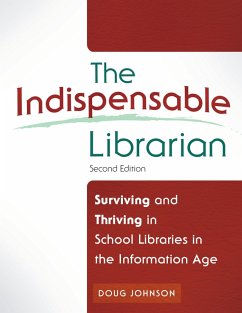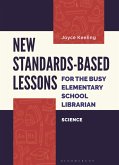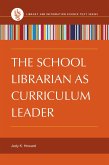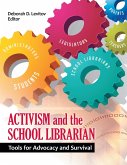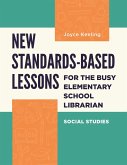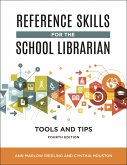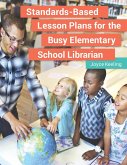Douglas A. Johnson
The Indispensable Librarian (eBook, ePUB)
Surviving and Thriving in School Libraries in the Information Age
30,95 €
30,95 €
inkl. MwSt.
Sofort per Download lieferbar

15 °P sammeln
30,95 €
Als Download kaufen

30,95 €
inkl. MwSt.
Sofort per Download lieferbar

15 °P sammeln
Jetzt verschenken
Alle Infos zum eBook verschenken
30,95 €
inkl. MwSt.
Sofort per Download lieferbar
Alle Infos zum eBook verschenken

15 °P sammeln
Douglas A. Johnson
The Indispensable Librarian (eBook, ePUB)
Surviving and Thriving in School Libraries in the Information Age
- Format: ePub
- Merkliste
- Auf die Merkliste
- Bewerten Bewerten
- Teilen
- Produkt teilen
- Produkterinnerung
- Produkterinnerung

Bitte loggen Sie sich zunächst in Ihr Kundenkonto ein oder registrieren Sie sich bei
bücher.de, um das eBook-Abo tolino select nutzen zu können.
Hier können Sie sich einloggen
Hier können Sie sich einloggen
Sie sind bereits eingeloggt. Klicken Sie auf 2. tolino select Abo, um fortzufahren.

Bitte loggen Sie sich zunächst in Ihr Kundenkonto ein oder registrieren Sie sich bei bücher.de, um das eBook-Abo tolino select nutzen zu können.
This readable and practical book examines the changes in school libraries brought by the digital revolution-and describes how new and experienced librarians can take advantage of them. Both a book of practical solutions to today's budgetary and staffing problems in school libraries as well as an advocacy book, The Indispensable Librarian: Surviving and Thriving in School Libraries in the Information Age, Second Edition provides a practice-based overview of all management topics that also supplies real-world scenarios, step-by-step instructions, and pragmatic solutions to specific problems. In…mehr
- Geräte: eReader
- mit Kopierschutz
- eBook Hilfe
- Größe: 2.51MB
Andere Kunden interessierten sich auch für
![New Standards-Based Lessons for the Busy Elementary School Librarian (eBook, ePUB) New Standards-Based Lessons for the Busy Elementary School Librarian (eBook, ePUB)]() Joyce KeelingNew Standards-Based Lessons for the Busy Elementary School Librarian (eBook, ePUB)33,95 €
Joyce KeelingNew Standards-Based Lessons for the Busy Elementary School Librarian (eBook, ePUB)33,95 €![The School Librarian as Curriculum Leader (eBook, ePUB) The School Librarian as Curriculum Leader (eBook, ePUB)]() Jody K. HowardThe School Librarian as Curriculum Leader (eBook, ePUB)33,95 €
Jody K. HowardThe School Librarian as Curriculum Leader (eBook, ePUB)33,95 €![Activism and the School Librarian (eBook, ePUB) Activism and the School Librarian (eBook, ePUB)]() Activism and the School Librarian (eBook, ePUB)33,95 €
Activism and the School Librarian (eBook, ePUB)33,95 €![New Standards-Based Lessons for the Busy Elementary School Librarian (eBook, ePUB) New Standards-Based Lessons for the Busy Elementary School Librarian (eBook, ePUB)]() Joyce KeelingNew Standards-Based Lessons for the Busy Elementary School Librarian (eBook, ePUB)33,95 €
Joyce KeelingNew Standards-Based Lessons for the Busy Elementary School Librarian (eBook, ePUB)33,95 €![Reference Skills for the School Librarian (eBook, ePUB) Reference Skills for the School Librarian (eBook, ePUB)]() Ann Marlow Riedling Ph. D.Reference Skills for the School Librarian (eBook, ePUB)37,95 €
Ann Marlow Riedling Ph. D.Reference Skills for the School Librarian (eBook, ePUB)37,95 €![Standards-Based Lesson Plans for the Busy Elementary School Librarian (eBook, ePUB) Standards-Based Lesson Plans for the Busy Elementary School Librarian (eBook, ePUB)]() Joyce KeelingStandards-Based Lesson Plans for the Busy Elementary School Librarian (eBook, ePUB)33,95 €
Joyce KeelingStandards-Based Lesson Plans for the Busy Elementary School Librarian (eBook, ePUB)33,95 €![The Image and Role of the Librarian (eBook, ePUB) The Image and Role of the Librarian (eBook, ePUB)]() Linda S KatzThe Image and Role of the Librarian (eBook, ePUB)29,95 €
Linda S KatzThe Image and Role of the Librarian (eBook, ePUB)29,95 €-
-
-
This readable and practical book examines the changes in school libraries brought by the digital revolution-and describes how new and experienced librarians can take advantage of them. Both a book of practical solutions to today's budgetary and staffing problems in school libraries as well as an advocacy book, The Indispensable Librarian: Surviving and Thriving in School Libraries in the Information Age, Second Edition provides a practice-based overview of all management topics that also supplies real-world scenarios, step-by-step instructions, and pragmatic solutions to specific problems. In this follow-up to his original book, Doug Johnson offers more practical methods and sage advice for leveraging technology's popularity and effectiveness to build stronger programs and cultivate beneficial professional connections and friendships. He defines and clarifies the role of the school library media specialist in a technologically enhanced school, providing relevant examples and useful advice on a variety of topics; and underscores the importance of strong management skills, especially regarding collaborative planning and communications. The book is written especially for K-12 school librarians, both new and experienced, and is also suitable for pre-service librarians as a textbook.
Produktdetails
- Produktdetails
- Verlag: Bloomsbury Publishing Inc
- Seitenzahl: 232
- Altersempfehlung: ab 7 Jahre
- Erscheinungstermin: 9. Mai 2013
- Englisch
- ISBN-13: 9798216102205
- Artikelnr.: 68354078
- Verlag: Bloomsbury Publishing Inc
- Seitenzahl: 232
- Altersempfehlung: ab 7 Jahre
- Erscheinungstermin: 9. Mai 2013
- Englisch
- ISBN-13: 9798216102205
- Artikelnr.: 68354078
- Herstellerkennzeichnung Die Herstellerinformationen sind derzeit nicht verfügbar.
Doug Johnson is director of Media and Technology at I.S.D. 77 Mankato Public Schools in Minnesota.
List of Figures Foreword: You Have to Be Mad Joyce Kasman Valenza
Acknowledgments Introduction to the Second Edition Chapter One: The Roles
and Missions of the Librarian The Virtual Librarian What are the challenges
facing our profession? Seven ways for librarians to remain relevant in a
ubiquitous information environment full of NetGen learners Do school
librarians have "enduring values"? Sample professional mission statement
and the elevator speech The Mankato transition: A case study For
reflection: Why are you in the profession? Chapter Two: Program Assessment
Creating long-term change How will you show your program is impacting
student achievement? Why assess your program? The formal library assessment
Ongoing assessments Context and focus A 12-point library program checklist
for principals For reflection: Linking libraries and reading achievement
Chapter Three: Planning Critical elements of a library/technology plan The
planning process Using goal setting to help in professional evaluations For
reflection: Twenty-plus years of working with advisory groups-what I've
learned Chapter Four: Communications and Advocacy What are the components
of an effective communications program? Speaking where people are listening
Can a good library program be a marketing tool for your school? What are
the basic rules of effective advocacy? For reflection: What is
transparency, and why is it critical to the librarian's success? Chapter
Five: Managing Others and Collaboration Working with the library support
staff Working with the technology department Working with the teaching
staff: The fundamentals of successful collaboration For reflection: What is
the secret to successful supervision? Chapter Six: Managing Digital
Resources You know you are a 21st-century librarian when . . . How has the
library's role changed as information and books go digital? What is cloud
computing, and how can librarians take advantage of it? For reflection:
E-books and libraries Chapter Seven: Curriculum Putting technology skills
in their place Integrating technology skills into an information literacy
curriculum Building an information/technology literacy curriculum Elements
of projects that motivate What new skills are needed to survive the
information jungle? How can librarians support the development of "right
brain" skills? For reflection: What does a library for a postliterate
society look like? Chapter Eight: Budget Budgeting as a library ethic Ten
strategies of effective library budgeters Good purchasing strategies For
reflection: Weed Chapter Nine: Facilities Why should I go to the library
when the library will come to me? The fundamentals of good school library
design and why they are still important Ten common design pitfalls and how
to avoid them For reflection: Are there schools that don't need a library?
Chapter Ten: Digital Intellectual Freedom Freedom to learn Maintaining
intellectual freedom in a filtered world Best practices for meeting CIPA
requirements Seven myths about Internet filters For reflection: Getting
websites unblocked Chapter Eleven: Ethics and Technology How has technology
impacted the ethical practice of librarians? Knowing right from wrong in
the digital age For reflection: Guidelines for educators using social and
educational networking sites Chapter Twelve: Copyright and Creative Commons
Make a copyright u-turn and other audacious statements about copyright
Creative Commons and why it should be more commonly understood For
reflection: Why students (and adults) satisfice Chapter Thirteen: The
Librarian's Role in Effective Staff Development The why, what, and who of
staff development in technology and the librarian's role How can we provide
effective staff development opportunities for our teachers? For reflection:
Top 10 ways to increase your technology skills and knowledge (and the
secret to being perceived as a technology guru) Chapter Fourteen: Surviving
Professional Transitions Personal learning networks-Why you can't afford to
wait for the next conference Finding the time When your job is on the line
. . . For reflection: Prevention Chapter Fifteen: Libraries and the Future
A mind-set list for librarians Miles's library: A vision for school
libraries For reflection: Prognostications for libraries and schools
Afterword: A Day of Ordinary Library Miracles Author's Note Index
Acknowledgments Introduction to the Second Edition Chapter One: The Roles
and Missions of the Librarian The Virtual Librarian What are the challenges
facing our profession? Seven ways for librarians to remain relevant in a
ubiquitous information environment full of NetGen learners Do school
librarians have "enduring values"? Sample professional mission statement
and the elevator speech The Mankato transition: A case study For
reflection: Why are you in the profession? Chapter Two: Program Assessment
Creating long-term change How will you show your program is impacting
student achievement? Why assess your program? The formal library assessment
Ongoing assessments Context and focus A 12-point library program checklist
for principals For reflection: Linking libraries and reading achievement
Chapter Three: Planning Critical elements of a library/technology plan The
planning process Using goal setting to help in professional evaluations For
reflection: Twenty-plus years of working with advisory groups-what I've
learned Chapter Four: Communications and Advocacy What are the components
of an effective communications program? Speaking where people are listening
Can a good library program be a marketing tool for your school? What are
the basic rules of effective advocacy? For reflection: What is
transparency, and why is it critical to the librarian's success? Chapter
Five: Managing Others and Collaboration Working with the library support
staff Working with the technology department Working with the teaching
staff: The fundamentals of successful collaboration For reflection: What is
the secret to successful supervision? Chapter Six: Managing Digital
Resources You know you are a 21st-century librarian when . . . How has the
library's role changed as information and books go digital? What is cloud
computing, and how can librarians take advantage of it? For reflection:
E-books and libraries Chapter Seven: Curriculum Putting technology skills
in their place Integrating technology skills into an information literacy
curriculum Building an information/technology literacy curriculum Elements
of projects that motivate What new skills are needed to survive the
information jungle? How can librarians support the development of "right
brain" skills? For reflection: What does a library for a postliterate
society look like? Chapter Eight: Budget Budgeting as a library ethic Ten
strategies of effective library budgeters Good purchasing strategies For
reflection: Weed Chapter Nine: Facilities Why should I go to the library
when the library will come to me? The fundamentals of good school library
design and why they are still important Ten common design pitfalls and how
to avoid them For reflection: Are there schools that don't need a library?
Chapter Ten: Digital Intellectual Freedom Freedom to learn Maintaining
intellectual freedom in a filtered world Best practices for meeting CIPA
requirements Seven myths about Internet filters For reflection: Getting
websites unblocked Chapter Eleven: Ethics and Technology How has technology
impacted the ethical practice of librarians? Knowing right from wrong in
the digital age For reflection: Guidelines for educators using social and
educational networking sites Chapter Twelve: Copyright and Creative Commons
Make a copyright u-turn and other audacious statements about copyright
Creative Commons and why it should be more commonly understood For
reflection: Why students (and adults) satisfice Chapter Thirteen: The
Librarian's Role in Effective Staff Development The why, what, and who of
staff development in technology and the librarian's role How can we provide
effective staff development opportunities for our teachers? For reflection:
Top 10 ways to increase your technology skills and knowledge (and the
secret to being perceived as a technology guru) Chapter Fourteen: Surviving
Professional Transitions Personal learning networks-Why you can't afford to
wait for the next conference Finding the time When your job is on the line
. . . For reflection: Prevention Chapter Fifteen: Libraries and the Future
A mind-set list for librarians Miles's library: A vision for school
libraries For reflection: Prognostications for libraries and schools
Afterword: A Day of Ordinary Library Miracles Author's Note Index
List of Figures Foreword: You Have to Be Mad Joyce Kasman Valenza
Acknowledgments Introduction to the Second Edition Chapter One: The Roles
and Missions of the Librarian The Virtual Librarian What are the challenges
facing our profession? Seven ways for librarians to remain relevant in a
ubiquitous information environment full of NetGen learners Do school
librarians have "enduring values"? Sample professional mission statement
and the elevator speech The Mankato transition: A case study For
reflection: Why are you in the profession? Chapter Two: Program Assessment
Creating long-term change How will you show your program is impacting
student achievement? Why assess your program? The formal library assessment
Ongoing assessments Context and focus A 12-point library program checklist
for principals For reflection: Linking libraries and reading achievement
Chapter Three: Planning Critical elements of a library/technology plan The
planning process Using goal setting to help in professional evaluations For
reflection: Twenty-plus years of working with advisory groups-what I've
learned Chapter Four: Communications and Advocacy What are the components
of an effective communications program? Speaking where people are listening
Can a good library program be a marketing tool for your school? What are
the basic rules of effective advocacy? For reflection: What is
transparency, and why is it critical to the librarian's success? Chapter
Five: Managing Others and Collaboration Working with the library support
staff Working with the technology department Working with the teaching
staff: The fundamentals of successful collaboration For reflection: What is
the secret to successful supervision? Chapter Six: Managing Digital
Resources You know you are a 21st-century librarian when . . . How has the
library's role changed as information and books go digital? What is cloud
computing, and how can librarians take advantage of it? For reflection:
E-books and libraries Chapter Seven: Curriculum Putting technology skills
in their place Integrating technology skills into an information literacy
curriculum Building an information/technology literacy curriculum Elements
of projects that motivate What new skills are needed to survive the
information jungle? How can librarians support the development of "right
brain" skills? For reflection: What does a library for a postliterate
society look like? Chapter Eight: Budget Budgeting as a library ethic Ten
strategies of effective library budgeters Good purchasing strategies For
reflection: Weed Chapter Nine: Facilities Why should I go to the library
when the library will come to me? The fundamentals of good school library
design and why they are still important Ten common design pitfalls and how
to avoid them For reflection: Are there schools that don't need a library?
Chapter Ten: Digital Intellectual Freedom Freedom to learn Maintaining
intellectual freedom in a filtered world Best practices for meeting CIPA
requirements Seven myths about Internet filters For reflection: Getting
websites unblocked Chapter Eleven: Ethics and Technology How has technology
impacted the ethical practice of librarians? Knowing right from wrong in
the digital age For reflection: Guidelines for educators using social and
educational networking sites Chapter Twelve: Copyright and Creative Commons
Make a copyright u-turn and other audacious statements about copyright
Creative Commons and why it should be more commonly understood For
reflection: Why students (and adults) satisfice Chapter Thirteen: The
Librarian's Role in Effective Staff Development The why, what, and who of
staff development in technology and the librarian's role How can we provide
effective staff development opportunities for our teachers? For reflection:
Top 10 ways to increase your technology skills and knowledge (and the
secret to being perceived as a technology guru) Chapter Fourteen: Surviving
Professional Transitions Personal learning networks-Why you can't afford to
wait for the next conference Finding the time When your job is on the line
. . . For reflection: Prevention Chapter Fifteen: Libraries and the Future
A mind-set list for librarians Miles's library: A vision for school
libraries For reflection: Prognostications for libraries and schools
Afterword: A Day of Ordinary Library Miracles Author's Note Index
Acknowledgments Introduction to the Second Edition Chapter One: The Roles
and Missions of the Librarian The Virtual Librarian What are the challenges
facing our profession? Seven ways for librarians to remain relevant in a
ubiquitous information environment full of NetGen learners Do school
librarians have "enduring values"? Sample professional mission statement
and the elevator speech The Mankato transition: A case study For
reflection: Why are you in the profession? Chapter Two: Program Assessment
Creating long-term change How will you show your program is impacting
student achievement? Why assess your program? The formal library assessment
Ongoing assessments Context and focus A 12-point library program checklist
for principals For reflection: Linking libraries and reading achievement
Chapter Three: Planning Critical elements of a library/technology plan The
planning process Using goal setting to help in professional evaluations For
reflection: Twenty-plus years of working with advisory groups-what I've
learned Chapter Four: Communications and Advocacy What are the components
of an effective communications program? Speaking where people are listening
Can a good library program be a marketing tool for your school? What are
the basic rules of effective advocacy? For reflection: What is
transparency, and why is it critical to the librarian's success? Chapter
Five: Managing Others and Collaboration Working with the library support
staff Working with the technology department Working with the teaching
staff: The fundamentals of successful collaboration For reflection: What is
the secret to successful supervision? Chapter Six: Managing Digital
Resources You know you are a 21st-century librarian when . . . How has the
library's role changed as information and books go digital? What is cloud
computing, and how can librarians take advantage of it? For reflection:
E-books and libraries Chapter Seven: Curriculum Putting technology skills
in their place Integrating technology skills into an information literacy
curriculum Building an information/technology literacy curriculum Elements
of projects that motivate What new skills are needed to survive the
information jungle? How can librarians support the development of "right
brain" skills? For reflection: What does a library for a postliterate
society look like? Chapter Eight: Budget Budgeting as a library ethic Ten
strategies of effective library budgeters Good purchasing strategies For
reflection: Weed Chapter Nine: Facilities Why should I go to the library
when the library will come to me? The fundamentals of good school library
design and why they are still important Ten common design pitfalls and how
to avoid them For reflection: Are there schools that don't need a library?
Chapter Ten: Digital Intellectual Freedom Freedom to learn Maintaining
intellectual freedom in a filtered world Best practices for meeting CIPA
requirements Seven myths about Internet filters For reflection: Getting
websites unblocked Chapter Eleven: Ethics and Technology How has technology
impacted the ethical practice of librarians? Knowing right from wrong in
the digital age For reflection: Guidelines for educators using social and
educational networking sites Chapter Twelve: Copyright and Creative Commons
Make a copyright u-turn and other audacious statements about copyright
Creative Commons and why it should be more commonly understood For
reflection: Why students (and adults) satisfice Chapter Thirteen: The
Librarian's Role in Effective Staff Development The why, what, and who of
staff development in technology and the librarian's role How can we provide
effective staff development opportunities for our teachers? For reflection:
Top 10 ways to increase your technology skills and knowledge (and the
secret to being perceived as a technology guru) Chapter Fourteen: Surviving
Professional Transitions Personal learning networks-Why you can't afford to
wait for the next conference Finding the time When your job is on the line
. . . For reflection: Prevention Chapter Fifteen: Libraries and the Future
A mind-set list for librarians Miles's library: A vision for school
libraries For reflection: Prognostications for libraries and schools
Afterword: A Day of Ordinary Library Miracles Author's Note Index
